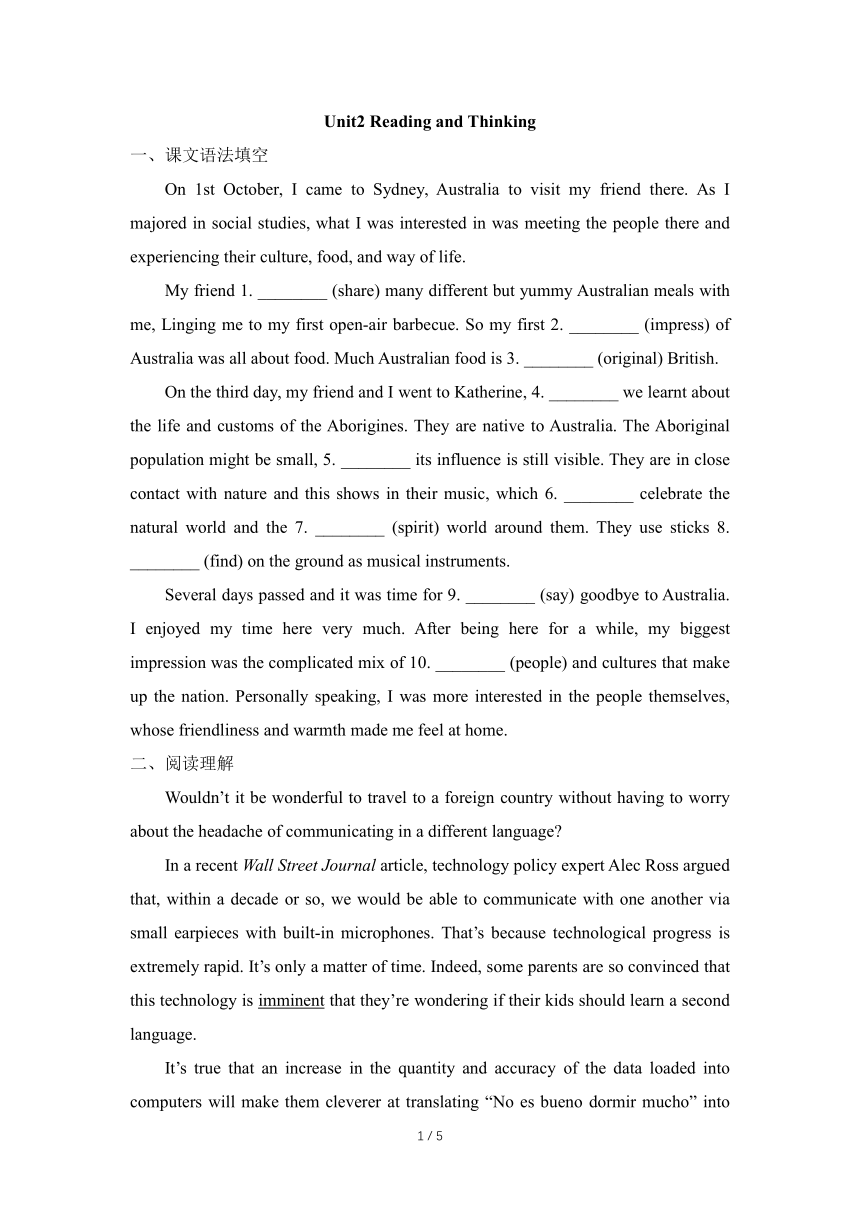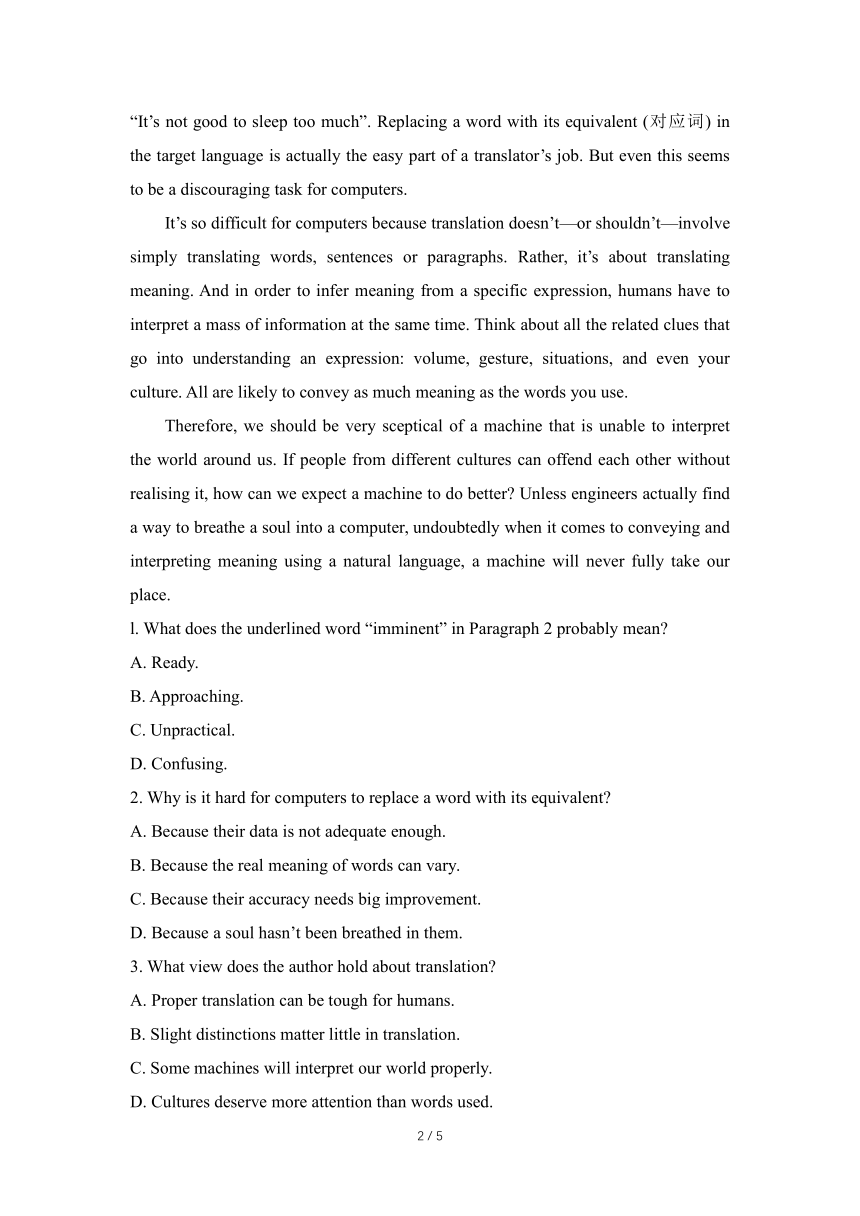人教版(2019)选择性必修第四册 Unit2 Iconic Attractions Reading and Thinking 课时素养练(含解析)
文档属性
| 名称 | 人教版(2019)选择性必修第四册 Unit2 Iconic Attractions Reading and Thinking 课时素养练(含解析) |  | |
| 格式 | docx | ||
| 文件大小 | 20.3KB | ||
| 资源类型 | 教案 | ||
| 版本资源 | 人教版(2019) | ||
| 科目 | 英语 | ||
| 更新时间 | 2023-03-14 14:54:11 | ||
图片预览


内容文字预览
Unit2 Reading and Thinking
一、课文语法填空
On 1st October, I came to Sydney, Australia to visit my friend there. As I majored in social studies, what I was interested in was meeting the people there and experiencing their culture, food, and way of life.
My friend 1. ________ (share) many different but yummy Australian meals with me, Linging me to my first open-air barbecue. So my first 2. ________ (impress) of Australia was all about food. Much Australian food is 3. ________ (original) British.
On the third day, my friend and I went to Katherine, 4. ________ we learnt about the life and customs of the Aborigines. They are native to Australia. The Aboriginal population might be small, 5. ________ its influence is still visible. They are in close contact with nature and this shows in their music, which 6. ________ celebrate the natural world and the 7. ________ (spirit) world around them. They use sticks 8. ________ (find) on the ground as musical instruments.
Several days passed and it was time for 9. ________ (say) goodbye to Australia. I enjoyed my time here very much. After being here for a while, my biggest impression was the complicated mix of 10. ________ (people) and cultures that make up the nation. Personally speaking, I was more interested in the people themselves, whose friendliness and warmth made me feel at home.
二、阅读理解
Wouldn’t it be wonderful to travel to a foreign country without having to worry about the headache of communicating in a different language
In a recent Wall Street Journal article, technology policy expert Alec Ross argued that, within a decade or so, we would be able to communicate with one another via small earpieces with built-in microphones. That’s because technological progress is extremely rapid. It’s only a matter of time. Indeed, some parents are so convinced that this technology is imminent that they’re wondering if their kids should learn a second language.
It’s true that an increase in the quantity and accuracy of the data loaded into computers will make them cleverer at translating “No es bueno dormir mucho” into “It’s not good to sleep too much”. Replacing a word with its equivalent (对应词) in the target language is actually the easy part of a translator’s job. But even this seems to be a discouraging task for computers.
It’s so difficult for computers because translation doesn’t—or shouldn’t—involve simply translating words, sentences or paragraphs. Rather, it’s about translating meaning. And in order to infer meaning from a specific expression, humans have to interpret a mass of information at the same time. Think about all the related clues that go into understanding an expression: volume, gesture, situations, and even your culture. All are likely to convey as much meaning as the words you use.
Therefore, we should be very sceptical of a machine that is unable to interpret the world around us. If people from different cultures can offend each other without realising it, how can we expect a machine to do better Unless engineers actually find a way to breathe a soul into a computer, undoubtedly when it comes to conveying and interpreting meaning using a natural language, a machine will never fully take our place.
l. What does the underlined word “imminent” in Paragraph 2 probably mean
A. Ready.
B. Approaching.
C. Unpractical.
D. Confusing.
2. Why is it hard for computers to replace a word with its equivalent
A. Because their data is not adequate enough.
B. Because the real meaning of words can vary.
C. Because their accuracy needs big improvement.
D. Because a soul hasn’t been breathed in them.
3. What view does the author hold about translation
A. Proper translation can be tough for humans.
B. Slight distinctions matter little in translation.
C. Some machines will interpret our world properly.
D. Cultures deserve more attention than words used.
4. What is the best title for the text
A. An Expert’s Precise Prediction
B. The Complexity of Translation
C. Who Will Be a Better Translator
D. Will the Language Barrier Actually Fall
参考答案
一、课文语法填空
1. shared
根据第一段中的came可知,此处应用一般过去时。故填shared。
2. impression
空处作主语,被my first修饰,且根据空后的was可知,此处应用可数名词单数形式。故填impression。
3. originally
此处表示许多澳大利亚的食物源于英国。空处作状语,应用词。故填originally。
4. where
分析句子结构可知,空处引导非限制性定语从句,先行词为Katherine,关系词在从句中作地点状语,应用关系副词。故填where。
5. but
空处前后是转折关系,故填but。
6. celebrates
空处在定语从句中作谓语,作主语的关系代词which指代先行词music,谓语动词应用第三人称单数形式。故填celebrates。
7. spiritual
空处在句中作定语修饰world,表示精神世界,应用形容词。故填spiritual。
8. found
分析句子结构可知,on the ground在句中作后置定语,find与sticks之间是逻辑上的动宾关系,应用过去分词。故填found。
9. to say
此处是“it’s time for sb to do sth”句型,应用动词不定式。故填to say。
l0. peoples
people在此意为“民族”,为可数名词,由语境可知,此处表示“多个民族”,应用名词复数形式。故填peoples。
二、阅读理解
【语篇导读】引本文是一篇议论文。去外国旅行而不用担心语言障碍是不是很美妙?本文以此展开,讨论了通过现代科学技术,语言障碍能不能变小甚至消失的问题。
1. B 词义猜测题。根据第二段最后两句可知,用高科技产品实现交流仅仅是个时间问题,一些父母十分相信这种技术即将来临,以至于他们不知道自己的孩子是否还需要学习第二语言。
2. B 细节理解题。根据第四段内容可知,翻译不仅仅是翻译单词、句子和段落,确切地说,它是有关意思的转换,为了推断一个具体短语的意思,人类不得不同时理解很多信息,由此可知,单词真正的意思是会随着语境的变化而变化的。
3. A 推理判断题。根据最后一段中的If people from different cultures can offend each other without realising it, how can we expect a machine to do better 可以推测出,准确的翻译对于人类来说很难。
4. D 标题归纳题。根据文章内容可知,本文主要讨论了语言障碍会不会变小的问题,故D项作本文标题最佳。
一、课文语法填空
On 1st October, I came to Sydney, Australia to visit my friend there. As I majored in social studies, what I was interested in was meeting the people there and experiencing their culture, food, and way of life.
My friend 1. ________ (share) many different but yummy Australian meals with me, Linging me to my first open-air barbecue. So my first 2. ________ (impress) of Australia was all about food. Much Australian food is 3. ________ (original) British.
On the third day, my friend and I went to Katherine, 4. ________ we learnt about the life and customs of the Aborigines. They are native to Australia. The Aboriginal population might be small, 5. ________ its influence is still visible. They are in close contact with nature and this shows in their music, which 6. ________ celebrate the natural world and the 7. ________ (spirit) world around them. They use sticks 8. ________ (find) on the ground as musical instruments.
Several days passed and it was time for 9. ________ (say) goodbye to Australia. I enjoyed my time here very much. After being here for a while, my biggest impression was the complicated mix of 10. ________ (people) and cultures that make up the nation. Personally speaking, I was more interested in the people themselves, whose friendliness and warmth made me feel at home.
二、阅读理解
Wouldn’t it be wonderful to travel to a foreign country without having to worry about the headache of communicating in a different language
In a recent Wall Street Journal article, technology policy expert Alec Ross argued that, within a decade or so, we would be able to communicate with one another via small earpieces with built-in microphones. That’s because technological progress is extremely rapid. It’s only a matter of time. Indeed, some parents are so convinced that this technology is imminent that they’re wondering if their kids should learn a second language.
It’s true that an increase in the quantity and accuracy of the data loaded into computers will make them cleverer at translating “No es bueno dormir mucho” into “It’s not good to sleep too much”. Replacing a word with its equivalent (对应词) in the target language is actually the easy part of a translator’s job. But even this seems to be a discouraging task for computers.
It’s so difficult for computers because translation doesn’t—or shouldn’t—involve simply translating words, sentences or paragraphs. Rather, it’s about translating meaning. And in order to infer meaning from a specific expression, humans have to interpret a mass of information at the same time. Think about all the related clues that go into understanding an expression: volume, gesture, situations, and even your culture. All are likely to convey as much meaning as the words you use.
Therefore, we should be very sceptical of a machine that is unable to interpret the world around us. If people from different cultures can offend each other without realising it, how can we expect a machine to do better Unless engineers actually find a way to breathe a soul into a computer, undoubtedly when it comes to conveying and interpreting meaning using a natural language, a machine will never fully take our place.
l. What does the underlined word “imminent” in Paragraph 2 probably mean
A. Ready.
B. Approaching.
C. Unpractical.
D. Confusing.
2. Why is it hard for computers to replace a word with its equivalent
A. Because their data is not adequate enough.
B. Because the real meaning of words can vary.
C. Because their accuracy needs big improvement.
D. Because a soul hasn’t been breathed in them.
3. What view does the author hold about translation
A. Proper translation can be tough for humans.
B. Slight distinctions matter little in translation.
C. Some machines will interpret our world properly.
D. Cultures deserve more attention than words used.
4. What is the best title for the text
A. An Expert’s Precise Prediction
B. The Complexity of Translation
C. Who Will Be a Better Translator
D. Will the Language Barrier Actually Fall
参考答案
一、课文语法填空
1. shared
根据第一段中的came可知,此处应用一般过去时。故填shared。
2. impression
空处作主语,被my first修饰,且根据空后的was可知,此处应用可数名词单数形式。故填impression。
3. originally
此处表示许多澳大利亚的食物源于英国。空处作状语,应用词。故填originally。
4. where
分析句子结构可知,空处引导非限制性定语从句,先行词为Katherine,关系词在从句中作地点状语,应用关系副词。故填where。
5. but
空处前后是转折关系,故填but。
6. celebrates
空处在定语从句中作谓语,作主语的关系代词which指代先行词music,谓语动词应用第三人称单数形式。故填celebrates。
7. spiritual
空处在句中作定语修饰world,表示精神世界,应用形容词。故填spiritual。
8. found
分析句子结构可知,on the ground在句中作后置定语,find与sticks之间是逻辑上的动宾关系,应用过去分词。故填found。
9. to say
此处是“it’s time for sb to do sth”句型,应用动词不定式。故填to say。
l0. peoples
people在此意为“民族”,为可数名词,由语境可知,此处表示“多个民族”,应用名词复数形式。故填peoples。
二、阅读理解
【语篇导读】引本文是一篇议论文。去外国旅行而不用担心语言障碍是不是很美妙?本文以此展开,讨论了通过现代科学技术,语言障碍能不能变小甚至消失的问题。
1. B 词义猜测题。根据第二段最后两句可知,用高科技产品实现交流仅仅是个时间问题,一些父母十分相信这种技术即将来临,以至于他们不知道自己的孩子是否还需要学习第二语言。
2. B 细节理解题。根据第四段内容可知,翻译不仅仅是翻译单词、句子和段落,确切地说,它是有关意思的转换,为了推断一个具体短语的意思,人类不得不同时理解很多信息,由此可知,单词真正的意思是会随着语境的变化而变化的。
3. A 推理判断题。根据最后一段中的If people from different cultures can offend each other without realising it, how can we expect a machine to do better 可以推测出,准确的翻译对于人类来说很难。
4. D 标题归纳题。根据文章内容可知,本文主要讨论了语言障碍会不会变小的问题,故D项作本文标题最佳。
